Rereading Uncle Ho's two letters to the class, along with the example of Mr. Huynh Thuc Khang and himself - a great revolutionary journalist, suggests a profound lesson for journalists today: writing is not just a profession, but a mission to fight for truth, justice and for the people.
Special Journalism Class
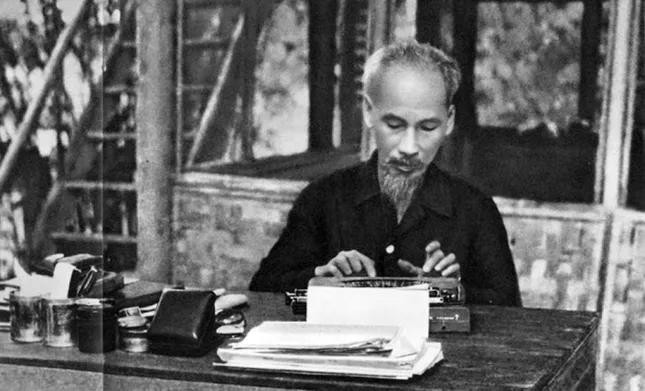
In 1949, in the middle of the Viet Bac resistance zone, amid the flames of the resistance war against French colonialism, a special class was opened under the direct instruction of President Ho Chi Minh. It was neither a military class nor a purely political class - it was the Huynh Thuc Khang journalism class, the first class to train revolutionary journalists during the resistance war.
The name of the class is symbolic: Mr. Huynh Thuc Khang (1876-1947) - a patriot, journalist, and cultural figure - founded and served as Editor-in-Chief of Tiếng Dân newspaper for 17 years (1927-1943), considered a "torch of wisdom and integrity" in the national journalism movement. He was the one who once said: "I write to open the eyes and hearts of the people, not to seek fame and fortune."
After the August Revolution, he was invited by President Ho Chi Minh to hold the position of Minister of the Interior , then Acting President in 1946 when he went to France. When he passed away in Quang Ngai in 1947, Uncle Ho wrote: "Mr. Huynh was a selfless and just person, who spent his whole life worrying about the country, not caring about fame or profit, a shining example of a veteran revolutionary". Naming the resistance journalism class after him was a way to commemorate him, and at the same time establish an ideal model of a journalist for the next generation: intelligence - morality - dedication.
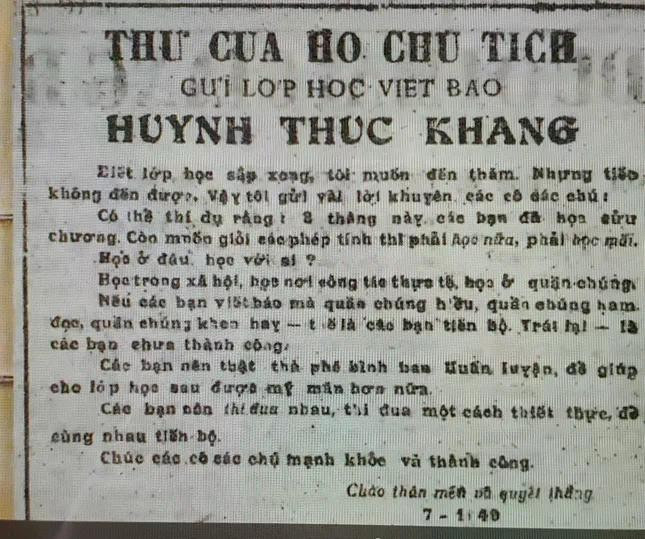
The classes were held in extremely poor conditions: bamboo huts, wooden tables, and flat paper were still luxuries. But the students' spirit of learning was as hot as the front line. They came from propaganda agencies, resistance offices, youth and women's organizations... Many later became great writers of the revolutionary press, editors-in-chief, sharp theorists, people who "held pens like holding guns".
The course program does not stop at writing news, articles, interviews, and commentary skills, but especially emphasizes political awareness, professional ethics, and the mettle of a journalist. A journalist is not just a person who delivers news, but also a person who guides, leads, creates trust, and nurtures revolutionary ideals. As Uncle Ho once said: "A journalist is also a revolutionary soldier. The pen is a sharp weapon. The page is the front."
That is the soul of Huynh Thuc Khang's journalism class - the birthplace of a generation of revolutionary journalists who had both profession and ideals, laying the foundation for modern revolutionary journalism later on.
Two letters of Uncle Ho - declaration of ethics and mission of revolutionary journalists
Although he did not teach directly, President Ho Chi Minh sent letters to the class twice - and those were the two greatest and most profound lessons for every generation of revolutionary journalists.
In the first letter, sent to the Huynh Thuc Khang journalism class (published in the Cuu Quoc newspaper on June 9, 1949), Uncle Ho clearly stated the role of revolutionary journalism is to propagate, agitate, train and organize people to serve the resistance and nation building. He emphasized: the press must serve the majority of the people, the content needs to be simple, easy to understand, practical, the form clean and clear.
He criticized some limitations of contemporary journalism such as political propaganda, slow news, use of difficult-to-understand Sino-Vietnamese words, and sloppy presentation. He advised: to write good journalism, one must be close to reality, know foreign languages to learn, and practice writing and editing skills carefully, and strive for progress.
At the end of the letter, Uncle Ho expressed his joy at having female students participating and encouraged the pioneering spirit, competition in studying and practicing, and implementing the slogan "All for victory!".
So, if you want to write for the newspaper, you have to learn. Learn to write correctly, write clearly, write practically, write attractively. Write so that everyone can read, understand, and follow. Those four instructions - correct, clear, practical, attractive - seem simple, but they are a professional platform. Writing for the newspaper is to ignite the revolutionary fire, spread correct information, convince people, strengthen national belief and unity.
In the second letter, sent when the class was about to end, Uncle Ho advised:
“These past three months you have learned the multiplication table. If you want to be good at calculations, you have to study more, study forever. Where do you study? Who do you study with? Study in society, study in real work, study with the masses. If you write articles that the masses understand, the masses love to read, the masses praise - that means you have made progress. On the contrary - that means you have not succeeded. You should honestly criticize the training team, to help the next class be even more perfect. You should compete with each other, compete in a practical way, to progress together.”
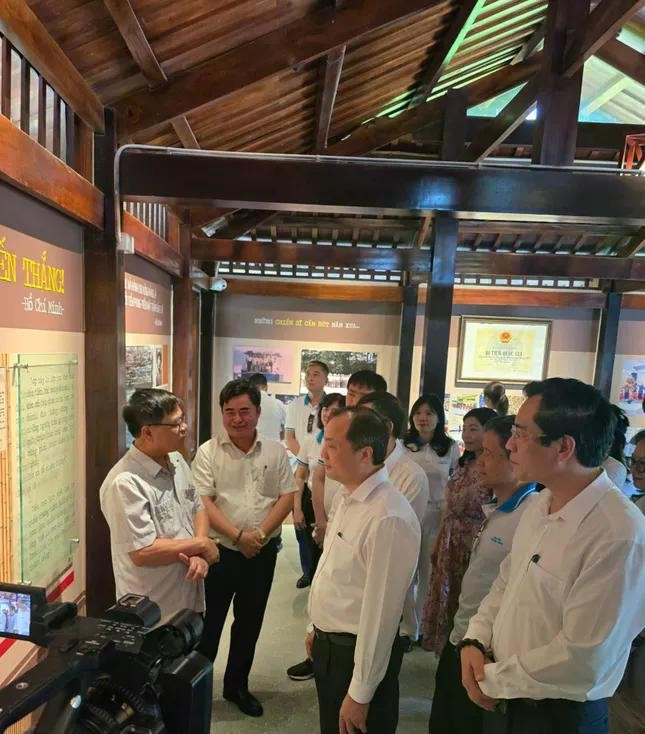
Uncle Ho's words are a sacred command. Writing for newspapers is not to be kept in a drawer but for the masses to read. Journalists must go out into the world, to the people, to the soldiers, to the compatriots. Writing for newspapers cannot be done sitting at a desk. Writing for newspapers is to fight the enemy, "all for victory" - foreign invaders, poverty, ignorance, bureaucracy, moral degradation - all enemies need writers to fight.
That was the ideal that ran through his entire revolutionary career. President Ho Chi Minh was a great journalist who wrote more than 2,000 articles and founded dozens of newspapers, from Le Paria, Nguoi Cung Kho in France, to Thanh Nien in Guangzhou, Viet Nam Doc Lap, Cuu Quoc, Su That, and Nhan Dan later. He used to write under different pen names, quietly sowing the seeds of revolutionary ideology in every class of people.
The Thanh Nien newspaper, published in 1925 - exactly 100 years ago - is a powerful proof: with only a rudimentary printing press in Guangzhou, Nguyen Ai Quoc initiated a movement to propagate Marxist-Leninist theory to the Vietnamese people. A journalist - also a revolutionary teacher.
Therefore, the two letters Uncle Ho sent to the Huynh Thuc Khang journalism class were not only personal messages, but also a spiritual testament for the Vietnamese revolutionary press: journalism is to serve ideals, not individuals. Writing is action, responsibility, and patriotism put into words.
The “all for win” spirit in the digital age
The Vietnamese revolutionary press has entered its 100th year (1925-2025) with many outstanding achievements: hundreds of press agencies, tens of thousands of reporters, editors, a strong team serving information - propaganda - criticism - social supervision. However, the press also faces unprecedented challenges: social networks dominate public opinion, fake news spreads quickly, the trend of commercialization and sensationalization of content is increasingly strong.
In that context, journalists today need to look back at the spirit of Huynh Thuc Khang's journalism class. Not to reminisce, but to find the core values to guide the way. From professional ethics to political courage, from the requirement of "being close to the people - understanding the people" to the ability to debate and inspire - all start from the right mindset: writing to serve justice, writing for the common interests of the nation - people - people.
In the era of AI, big data, and ever-changing media technology, journalists need to maintain their “professional mission” even more. Write quickly - but not superficially; write attractively - but not sensationally; write with a stance - but not imposing. Uncle Ho taught those values in the Viet Bac forest.
On the 100th anniversary of revolutionary journalism, let’s remember Huynh Thuc Khang - a journalist who did not care about fame or profit, but lived only for morality. Let’s remember Ho Chi Minh - the greatest journalist of the nation. Let’s remember the Huynh Thuc Khang journalism class - people who held pens like they held guns, in the middle of mountains and forests, amidst bombs and bullets, but their hearts were still as bright as torches.
According to Mai Le (TPO)
Source: https://baogialai.com.vn/doc-lai-thu-bac-gui-lop-hoc-viet-bao-huynh-thuc-khang-post329114.html




![[Photo] General Secretary To Lam presents the 45-year Party membership badge to comrade Phan Dinh Trac](https://vphoto.vietnam.vn/thumb/1200x675/vietnam/resource/IMAGE/2025/8/28/e2f08c400e504e38ac694bc6142ac331)
![[Photo] Prime Minister Pham Minh Chinh meets with Speaker of the New Zealand Parliament Gerry Brownlee](https://vphoto.vietnam.vn/thumb/1200x675/vietnam/resource/IMAGE/2025/8/28/cec2630220ec49efbb04030e664995db)
![[Photo] Politburo works with the Standing Committee of Cao Bang Provincial Party Committee and Hue City Party Committee](https://vphoto.vietnam.vn/thumb/1200x675/vietnam/resource/IMAGE/2025/8/28/fee8a847b1ff45188749eb0299c512b2)
![[Photo] General Secretary To Lam attends the opening ceremony of the National Achievements Exhibition](https://vphoto.vietnam.vn/thumb/1200x675/vietnam/resource/IMAGE/2025/8/28/d371751d37634474bb3d91c6f701be7f)
![[Photo] Red flag with yellow star flutters in France on National Day September 2](https://vphoto.vietnam.vn/thumb/1200x675/vietnam/resource/IMAGE/2025/8/28/f6fc12215220488bb859230b86b9cc12)
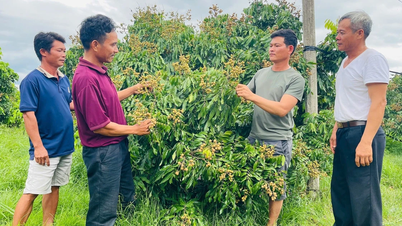
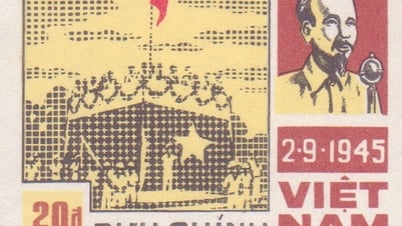


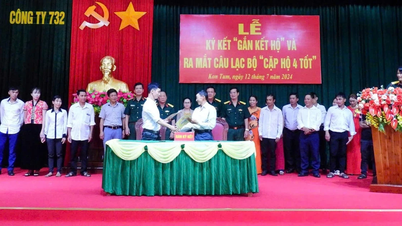
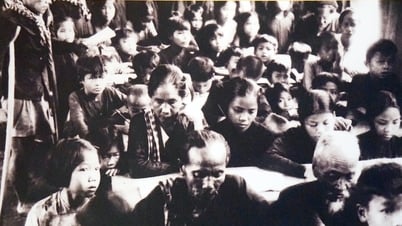

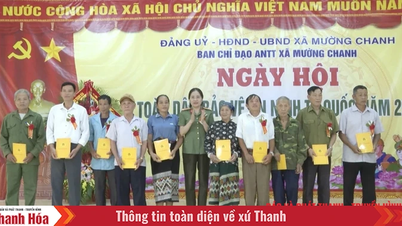



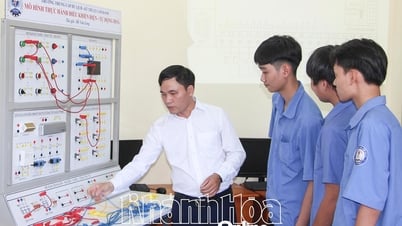

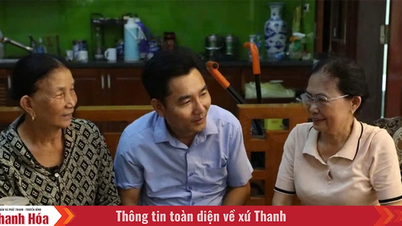


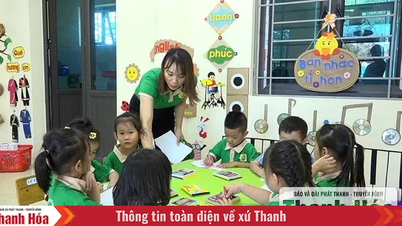
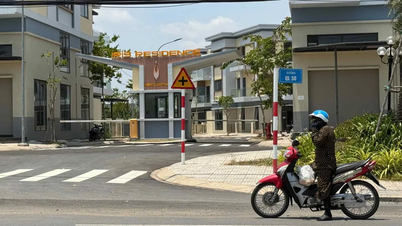





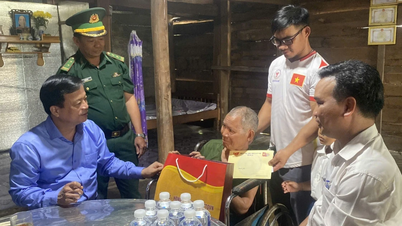
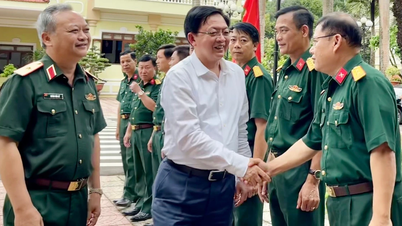
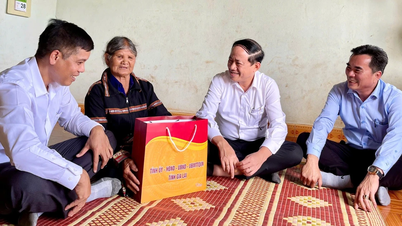
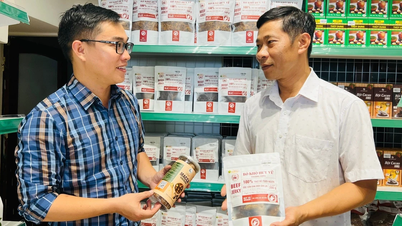
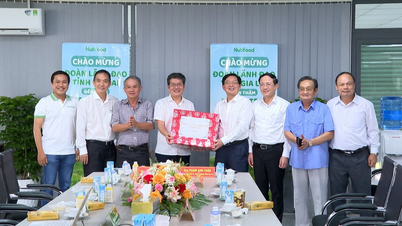
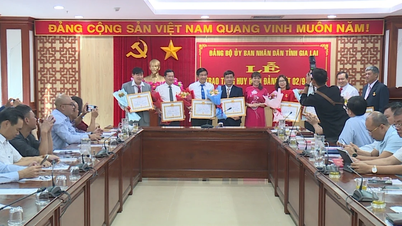





































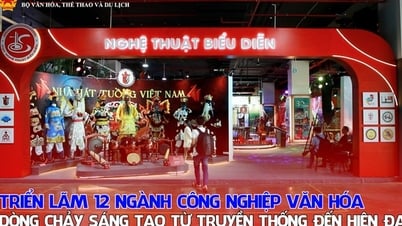




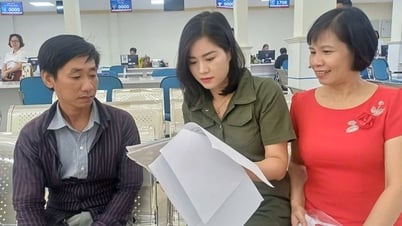
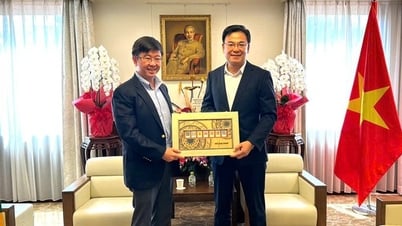



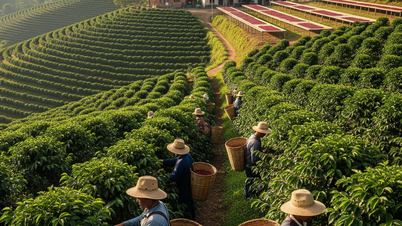

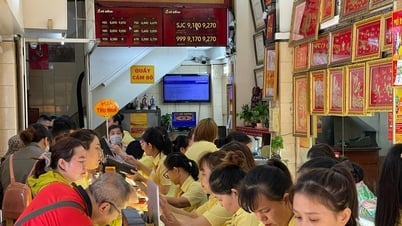
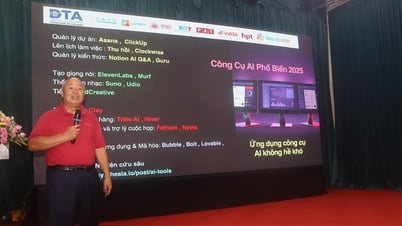















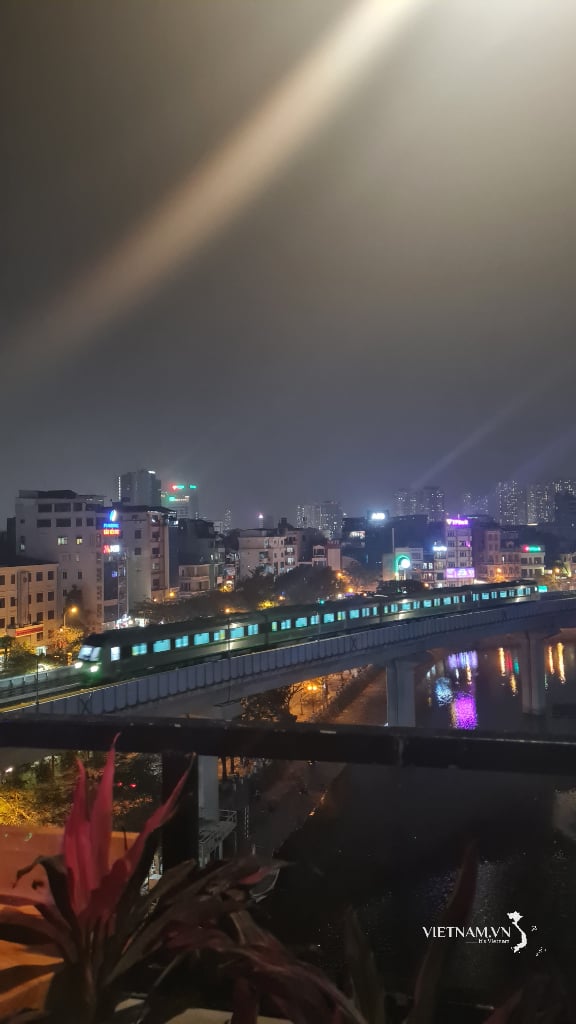
Comment (0)